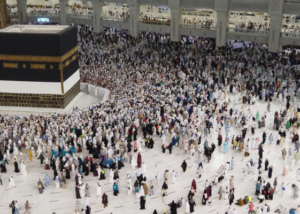Is it obligatory for Muslims to be different to Kufaar?
Quran
Hadith
Islamic Text
Yes, it is obligatory for Muslims to be different to Kufaar in religious matters and matters that are unique to the Kuffar.
أَلَمْ يَأْنِ لِلَّذِينَ آمَنُوا أَنْ تَخْشَعَ قُلُوبُهُمْ لِذِكْرِ اللَّهِ وَمَا نَزَلَ مِنْ الْحَقِّ وَلَا يَكُونُوا كَالَّذِينَ أُوتُوا الْكِتَابَ مِنْ قَبْلُ فَطَالَ عَلَيْهِمْ الْأَمَدُ فَقَسَتْ قُلُوبُهُمْ وَكَثِيرٌ مِنْهُمْ فَاسِقُونَ
Has the time not come for the hearts of those who believe to tremble with the remembrance of Allah and with what He has sent of the truth. And do not be like those who were given the scripture previously, time passed and their hearts hardened. And many of them were immoral. (Surah al-Hadeed, 16).
In the verse above, believers are told to be different to Kufaar of the Ahl Kitaab (people of the book), Jews and Christians. Although there is a recognition in Islam that we are closer to the Jews and Christians than other Kufaar, we are still required to differentiate ourselves from them. Therefore, this ruling would certainly apply to people of other religions. Imam Ibn Katheer comments on the verse above saying:
وَلِهَذَا نَهَى اللَّهُ الْمُؤْمِنِينَ أَنْ يَتَشَبَّهُوا بِهِمْ فِي شَيْءٍ مِنَ الْأُمُورِ الْأَصْلِيَّةِ وَالْفَرْعِيَّةِ. (تفسير ابن كثير)
Therefore, Allah (Most High) has forbidden the believers from imitating them (the Kufaar) in anything from the fundamentals (of religion) or the subsidiary (practices). (Tafsir Ibn Katheer).
There are numerous Hadith narrations that speak about the fact that it is obligatory for a Muslim to be different o the Kuffar, which demonstrates the significant concern of the Prophet (peace be upon him) regarding this matter.
أَنَّ عَبْدَ اللهِ بْنَ عَمْرِو بْنِ الْعَاصِ، أَخْبَرَهُ، قَالَ: رَأَى رَسُولُ اللهِ صَلَّى اللهُ عَلَيْهِ وَسَلَّمَ عَلَيَّ ثَوْبَيْنِ مُعَصْفَرَيْنِ، فَقَالَ: إِنَّ هَذِهِ مِنْ ثِيَابِ الْكُفَّارِ فَلَا تَلْبَسْهَا
‘Abdullah Ibn ‘Amr ibn al-’Aas (May Allah Most High be pleased with them both) said that the Messenger of Allah (Peace and Blessings be upon him) saw me wearing two saffron garments. He (Peace and Blessings be upon him) said, ‘Verily these are garments of the disbelievers, so do not wear them.’ (Sahih Muslim 2077 – 27).
عَنِ ابْنِ عُمَرَ، عَنِ النَّبِيِّ صَلَّى اللهُ عَلَيْهِ وَسَلَّمَ قَالَ: ” خَالِفُوا المُشْرِكِينَ: وَفِّرُوا اللِّحَى، وَأَحْفُوا الشَّوَارِبَ “ وَكَانَ ابْنُ عُمَرَ: إِذَا حَجَّ أَوِ اعْتَمَرَ قَبَضَ عَلَى لِحْيَتِهِ، فَمَا فَضَلَ أَخَذَهُ
On the authority of Ibn ‘Umar (may Allah be pleased with them both) that the Messenger of Allah (Peace and Blessings be upon him) said, ‘Oppose the idolators (in what they do) and make abundant the beard and trim the moustache.’ When Ibn ‘Umar (may Allah be pleased with them both) used to perform Hajj or ‘Umrah he would take hold of his beard and would trim whatever was beyond it. (Sahih al-Bukhari, 5892).
إِنَّ أَبَا هُرَيْرَةَ رَضِيَ اللَّهُ عَنْهُ، قَالَ: إِنَّ رَسُولَ اللَّهِ صَلَّى اللهُ عَلَيْهِ وَسَلَّمَ، قَالَ: إِنَّ اليَهُودَ، وَالنَّصَارَى لاَ يَصْبُغُونَ، فَخَالِفُوهُمْ
Abu Hurairah (Allah be pleased with him) said that the Messenger of Allah (Peace and Blessings be upon him) said, ‘Verily the Jews and the Christians do not dye (their hair) so oppose them.’ (Sahih al-Bukhari, 3462).
Unfortunately, many Muslims do not understand this religious teaching, and therefore actively try to assimilate with the Kuffar. Whereas the religious guidance is to do the opposite. The Muslim should be proud of his or her uniqueness. Standing apart from the crowd should be a means of pride not shame. Being strong, unique and independent is what our Prophet (peace be upon him) wanted for us. Whereas many Kuffar want us to lose our identity and uniqueness. Whose advise will you take?
And Allah Most High Knows Best.
-Answered by Shaykh Noorud-deen Rashid (01.03.2022)
-Special thanks to Sidi Yusuf Asghar for assisting with Nusoos translation.
See also:
How strong is the Hadith ‘whoever imitates a people is from them’?
Congratulating Christians on Christmas in Hanbali Madhab
Is it permitted to say Happy New Year?
See also (video):






